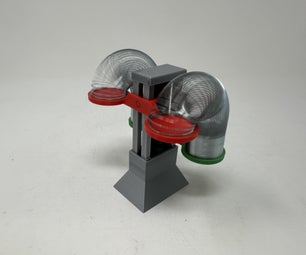Introduction: Fix Old Scissors
I recently had a conversation with a work colleague while they were struggling to cut something with those cheap modern scissors they make these days. We talked about how junky they are compared to old-school scissors you can sharpen and use for generations.
Sure enough, a couple of days later I came across a pair of rusty old scissors that I wanted to breath some new life into.
Supplies
Parts
- Old scissors
- Bolt
Tools
- Wire brush or wire wheel on grinder
- Drill
- Screwdrivers
- Hex Keys
- Spanner
- File
- Tap and Tap handle
- Sharpening stones
- Vinegar
Step 1: Disassemble & Clean
The first step is to disassemble the scissors, most of the time you can just undo a lock nut and then unscrew the bolt. Sometimes the scissors might riveted and you could need to carefully file down and drill out the rivet.
On this occasion, it looked like it started as a bolt, which was then hammed into a rivet. I ended up carefully drilling the bolt out. Unfortunately this damaged the thread, but we'll fix that later.
Once the scissors are taken apart you need to clean off any surface rust or dirt with a wirebrush. I have a wire wheel on my bench grinder so I used that. Of course you could give it a light sand or scrub with steel wool. The point is to just give it a quick clean at this stage.
Step 2: Soak the Scissors in Vinegar
This is the super easy part, get a container and submerge the scissors in white vinegar. Now leave them to soak for a day or two. You can check them now and then if you want and see if the rust rubs off.
Once you are finished don't throw out the vinegar, you can put it in a bottle and keep using it.
Step 3: Final Clean
Remove the scissors from the vinegar and give them a wash in soapy water. Make sure to dry them otherwise, they will likely flash rust.
Now take them back to the wire brush and spend the time to really buff them up. At this stage they normally come up pretty decent, if there some heavy rust flakes you could carefully sand these out.
Step 4: Sharpen the Scissors
The first part of sharpening old scissors is to flatten the bottom of each blade. To do this use a sharpening stone or diamond plates as a polishing surface. You don't need to flatten the entire blade, just a couple of millimeters of the edge.
The last stage is to use the stone to polish the bevel on the cutting edge in starting from the outside and in the direction of the cutting edge. It's not a race so take slow even strokes.
Step 5: Fix the Scissors
Hopefully, your scissors weren't damaged in the disassembly step and you can just put them back together, otherwise read on.
I normally just drill a 4mm hole and tape this to an M5 thread. I then carefully grind or file down the head of an M5 Cap screw to make it a little more low profile.
Now bolt the scissors together being careful to adjust the tension so the scissors are firmly together and still able to move smoothly. Now install a lock nut onto the bolt, this will stop the cap screw from undoing as you use the scissors.
Lastly cut the bolt to the correct length and carefully file the bolt flat.
Step 6: Painting
Now you just need to clean the scissors using something like methylated spirits, acetone or brake cleaner and then use painter's tape to mask the scissors.
Now use the appropriate paint and primer to coat the handles.
Once the painting is completed remove the tape, and just the blades a light oil.

Participated in the
Fix It Contest













